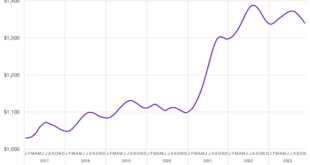There is an untold story in American monetary history. Some are reluctant even to discuss it. I’m referring to the US Secret Service’s very own role in the destruction of sound money in America. As constitutional, sound money in the form of physical gold and silver coins—whether minted privately or not—became an annoying impediment to expanding the size and power of the federal government, central planners began circulating unbacked paper proxies and formed...
Read More »Negative Leverage: The Fed’s Latest “Gift” to Apartment Investors
The Federal Reserve’s inflation of the money supply and interest rate manipulation distort capital markets through, among other things, the creation of asset bubbles. As the cost of borrowing decreases and cheap money floods an economy, speculation in capital markets increases, leading to prices unmoored from fundamentals. Underlying these asset bubbles is a certain investor psychology—one based on expectations, encouraged by Fed actions over the last thirty-five...
Read More »Wonka: A Tale of Evil Businessmen and Cronyism
Wonka (2023) is a prequel film to the beloved story Charlie and the Chocolate Factory by Roald Dahl. Wonka tells the story of a young Willy Wonka, an up-and-coming chocolate salesman and magician, who challenges a chocolate cartel’s dominance. As one could imagine, the film is full of scenes that cast private enterprise in a negative light. The main villains are stereotypical movie businessmen who will do anything, even murder, to achieve their ambition for higher...
Read More »Headline Math, Women’s Wages, and a Very Bad Deal in Higher Education
Headline math is a simple percentage expressed as a fact without context. Its design is to create an emotional response, support an opinion, or generate a click past the paywall. Once articulated, it exists in speech as a noun. W. Brian Arthur’s paper “Economics in Nouns and Verbs” explains the use of nouns to express a conclusion as fact, excluding further discussion. Student loan statistics for women are presented as facts, needing no further thought or...
Read More »It Began with Carl Menger: The Austrian Intellectual Triumph
Near the end of the nineteenth century, the European intellectual scene witnessed a remarkable theoretical contest known as the “battle of methods,” or in German, Methodenstreit. This intellectual clash stood out due to the confrontation between the precepts of methodological and subjective individualization, equipped with a subjectivist and individualizing worldview of the method. It was represented by figures such as Carl Menger (considered the founder of the...
Read More »Markets versus State Healthcare Systems: Some Points of Contention
Progressives claim that state-sponsored healthcare systems are superior to market-based systems. Their arguments don’t add up. Original Article: Markets versus State Healthcare Systems: Some Points of Contention [embedded content] Tags: Featured,newsletter
Read More »DC’s Debt Trap
Federal debt is soaring out of control, and perhaps it is not surprising that the CBO has not updated its forecasts with this debt uncertainty. Original Article: DC's Debt Trap [embedded content] Tags: Featured,newsletter
Read More »Biden’s “AI Bill of Rights” May Just Be Another Censorship Plan
President Joe Biden is promoting his “AI Bill of Rights,” which looks to be an attempt to censor political opposition. Naturally, political and media elites are enthusiastically endorsing it. Original Article: Biden's ""AI Bill of Rights"" May Just Be Another Censorship Plan [embedded content] Tags: Featured,newsletter...
Read More »Do Destroyed Monuments Represent a Past Not Worth Defending?
Many cities and states in this country have been tearing down or destroying monuments because they represent part of a past that progressives and leftists believe should not have existed. Yet each time we tear down something, we potentially lose part of an important heritage. Original Article: Do Destroyed Monuments Represent a Past Not Worth Defending? [embedded content]...
Read More »Secession
This week's episode begins 2024 by looking at the growing political divide among the American people—and how to solve it. Be sure to follow Minor Issues at Mises.org/MinorIssues. Get your free copy of Murray Rothbard's Anatomy of the State at Mises.org/IssuesFree. [embedded content] Tags: Featured,newsletter
Read More » Swiss Economicblogs.org
Swiss Economicblogs.org





